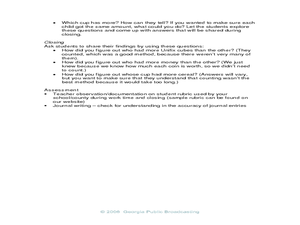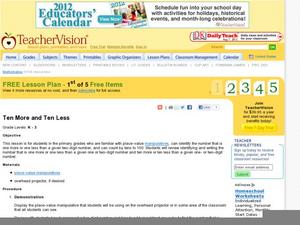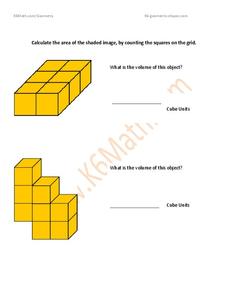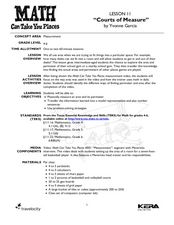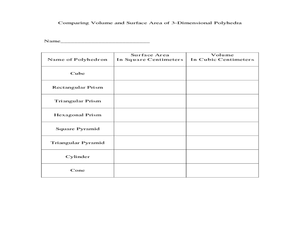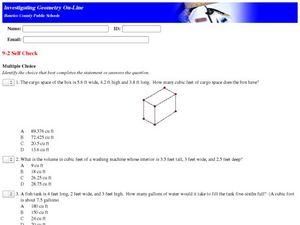Curated OER
How Many More on a Graph?
First graders identify a number that is one more or one less than a number up to one hundred and identify a mystery number. They also create a class graph that illustrates how many children are in each family, and answer questions about...
Curated OER
Area and Measurements
Students measure the area using feet and yard. For this algebra lesson, students draw and manipulate shapes to calculate the area. They measure the relationship of area between the two units.
Curated OER
Perimeter, Area and Volume
In this geometry instructional activity, 10th graders solve problems by finding the perimeter, area and volume of polygons. There are 17 questions with an answer key.
Curated OER
More! A Lesson on Comparing
Students practice counting and comparing objects. In this math lesson, students view a Count on It! episode. Students examine the value of what they are counting. Students estimate number in groups of items. Students determine which...
Balanced Assessment
Egyptian Statue
Investigate the proportional relationships of length, area, and volume. Learners use the dimensions of rectangular prisms to create ratios and proportions. They compare the different ratios to solve more advanced problems.
Curated OER
Board Game: Race to 100
Who can get to 100 first?! It may be in the hands of chance, but either way kids will have to practice counting and adding along the way. Partners take turns rolling two dice and moving their game pieces that many spaces until one pupils...
DiscoverE
Foil Boats
How many pennies can an aluminum foil boat hold? That is the challenge in a collaborative activity designed to explore the concept of buoyancy. Learners use aluminum foil to build makeshift boats and test the weight they hold before...
Pennsylvania Department of Education
Problem Solving by Using Multiplication to Solve Division Problems
Students use index cards, counting cubes, and their own understanding to identify how division problems can be solved by using multiplication. In this division lesson plan, students use their multiplication skills to solve division...
Curated OER
Problem Solving: Perimeter, Area, or Volume?
In this perimeter, area, or volume worksheet, students read the word problems and determine whether to problem solve to find the perimeter, area, or volume to answer the six word problems.
Curated OER
Ten More and Ten Less
Get learners to analyze two-digit numbers based on place value, and use manipulatives to add and subtract both 1 and 10. A place value chart is available, and you can project it during guided practice. Through visualizing numbers,...
Curated OER
Cube Models
Sixth graders are introduced to the concepts of area and volume. In groups, they work together to build models of square centimeters in which they are given no instructions. To end the lesson, they record the dimensions of each model...
Curated OER
Calculate Area Using Shaded Grids
In this area worksheet, students calculate area of shapes using shaded grids, writing answers in cube units. A reference web site is given for additional activities.
Curated OER
Calculating Area
In this area activity, students calculate the area of shaded figures shown on grids. A reference web site is given for additional activities
Curated OER
Courts of Measure
Students practice their area and perimeter measurement. In this measurement lesson, students watch a video about perimeter and area. Students measure a gym for perimeter and area. Students write number sentences for the area and...
Curated OER
Volume Of A Prism
Eighth graders investigate the concept of a prism and finding the volume. They begin the inquiry by attempting to find the surface area in order to begin the inquiry. Students are expected to apply memory for the mathematical formulas in...
Curated OER
Cell Reproduction
In this cell reproduction worksheet, students will discover that when a cube doubles in size, the surface area grows by four times and the volume grows by eight times. Students will use this information to understand the limits to cell...
Curated OER
The Value of Volume
Students measure the perimeter and area of their polygons. For this geometry lesson, students calculate the volume and area using the correct tools. They calculate the time and temperature and the perimeter and side lengths of triangles.
Curated OER
Geometric Shapes
In this geometry and shapes worksheet, 5th graders practice calculating the shaded area of 2 objects. Students count the squares on 2 grids to find the volume of each object in cube units.
Achieve
Dairy Barn
Agriculture is truly a math-based profession! Help the dairy farmer determine the supplies needed to complete his barn. Using given dimensions, learners build equations and use units to determine the correct amount of materials.
Curated OER
Volume
In this volume worksheet, students determine the number of cuboids needed to create a rectangular prism of a particular size. They determine the mass, volume and density of cereal boxes. Students determine the volume of rectangular...
West Contra Costa Unified School District
Adding by finding 10's
Count with ten frames in a first grade addition lesson. Kids determine how to identify numbers on a number line, as well as with ten frames, and complete ten frames to show their answers in several addition problems.
Curated OER
Spoonfuls, Cupfuls and Handfuls
Explore the use of non-standard units for measuring volume with elementary learners. They fill a container and count the number used using cups, spoons, and bottles, build with blocks and count the number of blocks used, and compare and...
Illustrative Mathematics
Building toward fluency
Here is a great learning task that focuses on the development of areas in computational fluency including strategies in mental math. Young learners are guided through a list of addition expressions that help them visually understand the...
Pennsylvania Department of Education
Making Cubes
Third graders explore vocabulary associated with three dimensional figures. In this transformations lesson plan, 3rd graders create two dimensional nets for three dimensional figures. Students become familiar with describing two and...





